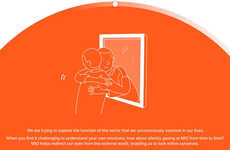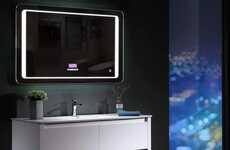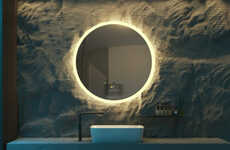
The Surface of This Reflective Glass is Motion-Controlled
Ellen Smith — June 26, 2017 — Tech
References: twowaymirrors & producthunt
The interactive Smart Mirror is reflective of the future -- literally. Using vanity vision, this mirror acts as a touchable interface that provides users with the opportunity to use a mirror as they would a smartphone. Equipped with voice recognition, augmented reality displays, hidden camera recording, teleconferencing and Skype and touchscreen abilities, this smart glass mirrors the future.
By using VanityGlass, the company responsible for the interactive Smart Mirror was able to craft a mirror that's 30 percent more reflective than regular two-way glass, offering heightened security and enhanced viability. Through the Smart Mirror, users can scroll through the news, watch YouTube videos and video chat with friends or simply pretend they're in The Matrix through the device that disguises itself as a traditional mirror when not in use.
By using VanityGlass, the company responsible for the interactive Smart Mirror was able to craft a mirror that's 30 percent more reflective than regular two-way glass, offering heightened security and enhanced viability. Through the Smart Mirror, users can scroll through the news, watch YouTube videos and video chat with friends or simply pretend they're in The Matrix through the device that disguises itself as a traditional mirror when not in use.
Trend Themes
1. Interactive Smart Mirrors - The integration of augmented reality displays, touch screens and voice recognition technology will transform the way we interact with mirrors.
2. Mirror-based Augmented Reality - The rise of mirrors with augmented reality capabilities opens new opportunities for gaming, education and retail experiences.
3. Smart Home Integration - As smart mirrors become more widespread, they create new opportunities for integration with other connected devices in the home, such as voice assistants and smart lighting systems.
Industry Implications
1. Retail - Retail businesses can incorporate augmented reality mirrors for virtual try-on features, interactive product displays and product education.
2. Hospitality - Hotels and resorts can offer guests cutting-edge technology with augmented reality mirrors that provide virtual concierge services, information on local attractions and activities, and in-room entertainment options.
3. Home Decor - As smart home technology becomes more mainstream, mirrors with augmented reality features can enhance home decor and provide value-added services like personalized fitness routines, skincare advice and voice-activated controls for other connected devices.
5.9
Score
Popularity
Activity
Freshness























